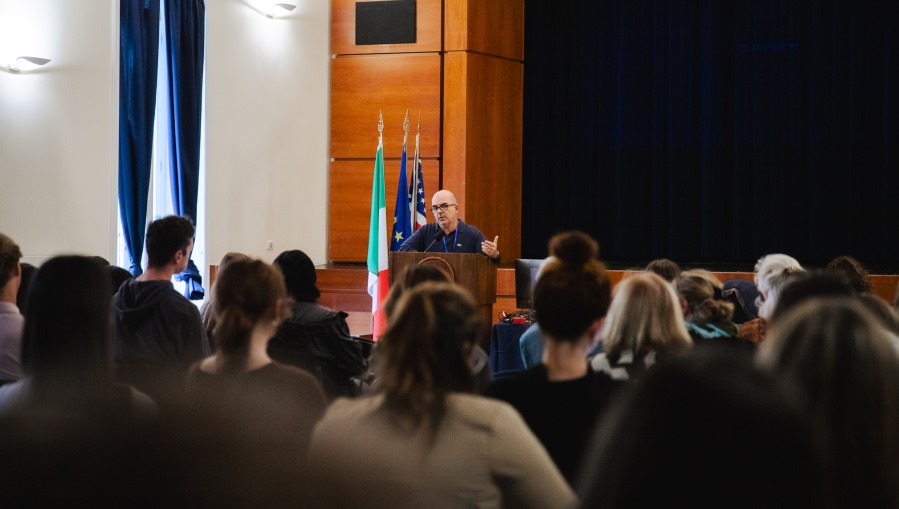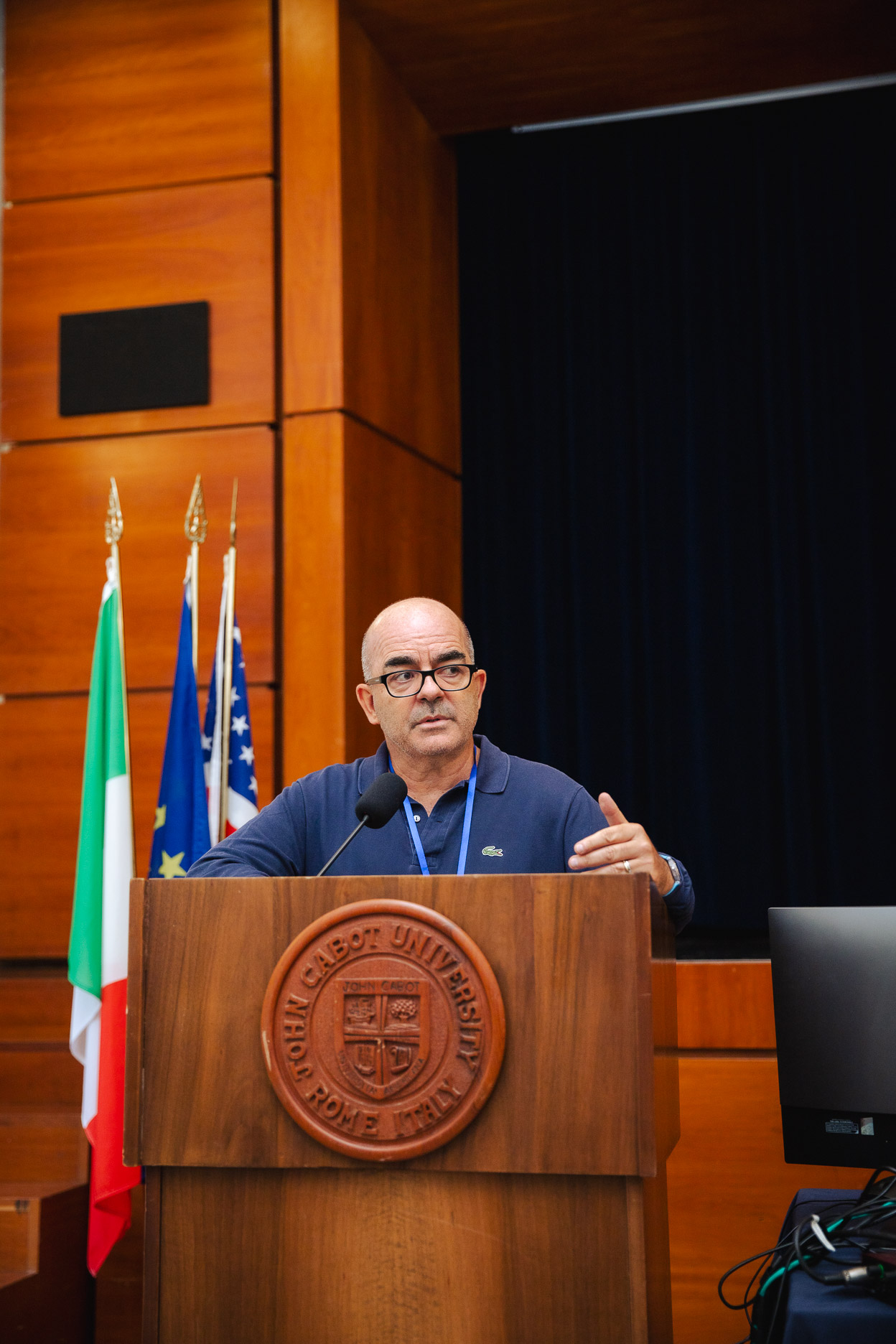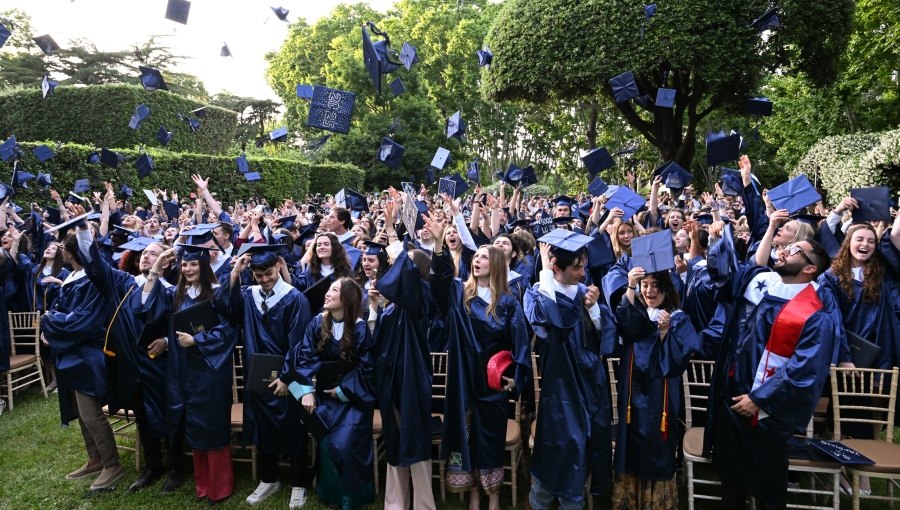Why We Need the Humanities: JCU Welcomes Nicola Gardini from Oxford University

On September 18, 2024, the Department of Modern Languages and Literature welcomed Nicola Gardini, Professor of Italian and Comparative Literature at Oxford University for a lecture entitled “Why We Need the Humanities.”
Professor Federica Capoferri, Chair of the Department of Modern Languages and Literature introduced Professor Gardini, who holds a Ph.D. from New York University and is a poet, novelist, translator, and painter, as well as a scholar. He has authored numerous books including Viva il latino (Garzanti,2016), Viva il greco (Garzanti, 2021), and Studiare per amore (Garzanti, 2024).

The humanities: a historical overview
The study of the humanities, said Gardini, began as a dialog with antiquity during the Renaissance, especially in the 15th and 16th centuries, with the discovery or rediscovery of ancient texts. It was then that the concept of humanities was first shaped, and it has endured over the centuries.
“What could the ancients teach us?” asked Gardini. “First of all, they taught an important notion, a fundamental value, that human beings must become better, better humans, better individuals, and better citizens because we must deserve to belong in our society. So indeed, education is not just for the sake of erudition, not just as an end, but because it has a civic purpose, with ideals of justice and peace.” Gardini pointed out that in The Prince (1513)¸ Machiavelli ends his discourse by discussing peace, social stability, and spiritual growth.
Another good example of the humanities, according to Gardini, is Ludovico Ariosto’s epic poem Orlando Furioso (1516), whose complicated, multi-plotted narrative presents the reader with a wealth of possibilities and events, and possible interpretations of those events.
“The humanities encourage us to use a relativistic point of view. Distance yourself, analyze what you think, question it, and don’t take it for granted. There are other points of view that deserve to be listened to and scrutinized and you also need to scrutinize yourself. Self-questioning is indeed very much a part of the humanities,” continued Gardini.
He pointed out that the Renaissance idea of the humanities, with its focus on learning Latin and Greek, was actually very elitist. Even though the Renaissance praised the ideal of Athenian democracy, many people were excluded from it, starting from women and slaves.
During the Renaissance, the vernacular was promoted to a fully-fledged literary language, encouraging people to cultivate its capabilities. That enabled women to have easier access to learning, which is why the 16th century witnessed so many excellent women poets. This is when the paradigm of humanities started to broaden.
Faith in the totality of knowledge
Behind the notion of the humanities lies a deep faith in human excellence. During the Renaissance, many forms of knowledge and expression could actually co-exist in one person. An important thing to keep in mind, according to Gardini, is that someone like Machiavelli did not just specialize in one field. He was a political thinker, he wrote for theater, he was a linguistic theorist, and a historian.
The faith in the totality of knowledge, with no disciplinary divides between forms of learning, is something we have lost over the centuries, and something that Gardini firmly believes we need to resurrect. Humanities have come to exclude science, technology, and economics. “But consider Leonardo Da Vinci; we think of him as a great artist, but he mostly thought of himself as a scientist.” Indeed, he did not think that literature should be excluded because science was better. Today not only have we created great divides between fields of knowledge, but a conflict has developed between science and the humanities.
What makes the humanities different today
Obviously much has changed in the world throughout the centuries. Gardini focused on the advent of AI (“the great elephant in the room”) and the use of big data, which influences our understanding of the world. Experts use big data not only to describe the past but to predict the future, and more importantly to shape it and channel it towards given ends. This has become a serious problem, which leads us to ask many questions. How free are we? Are we just consumers? We go online and we see a menu of choices, but that menu of choices has been created by others for us, we’re not selecting freely, even though we have the illusion of choosing freely.
According to Gardini, these changes should push us to have an even stronger belief in the humanities, because that’s the realm of listening, discussion, scrutiny, self-questioning, understanding, comparing, and creating a historical awareness of what we are and where we are. Despite the general shift in university curricula toward science subjects and vocational skills, it is now more necessary than ever not to abandon the study of the humanities.
The idea of Concordia
“I want to conclude,” said Gardini, “with one very humanities word, which comes from the first definition of the humanities, the idea of concordia,” a concept that philosopher Pico della Mirandola worked on with great passion. An important Neoplatonist philosopher, Mirandola wrote a famous treatise called Oration on the Dignity of Man (1496), in which he explains that all visions, all perspectives, all religions, ultimately talked about one thing, the beauty of human life and the essence of mankind. So, no matter how different we think we are from each other in terms of religion or philosophy, we’re all talking about one thing, albeit in different ways.
Gardini also believes that the concept of concordia is a very convenient term to refer to the fact that there should be no divide between sciences and humanities. We should bring back to life the idea of an encyclopedic understanding of knowledge that characterized the first definition of the humanities from the 15th and 16th centuries.
“Although times have changed, we need to keep the original ideas of the humanities alive, enriching them with our differences, with what we have invented in the meantime. We want to renew this understanding of the humanities and remember what is at its very core, the idea of newness, renovation, rebirth. I really hope that I convinced someone that the humanities are here to make us better citizens of the planet,” concluded Gardini.
A lively question and answer session ensued, with Gardini acknowledging the challenges faced by university humanities departments while emphasizing how important it is for educators to focus on creating a positive learning environment and inspiring students to value humanistic principles.
(Berenice Cocciolillo)





